Ethics and Law: Analyzing a Health & Social Care Case Study Review
VerifiedAdded on 2023/02/01
|13
|3565
|70
Case Study
AI Summary
This case study examines legal and ethical dilemmas within health and social care, drawing inspiration from the Mid Staffordshire NHS Foundation Trust inquiry. It focuses on a 76-year-old widow, Edith, and the challenges she faces in accessing healthcare funding and maintaining her well-being. The study identifies key issues such as the rejection of healthcare funding and direct payments under the Care Act 2014, as well as instances of patient neglect and unprofessional conduct by healthcare staff. It further analyzes these issues in relation to relevant legislation, including the NHS Constitution for England, the Care Act 2004, the Human Rights Act 1998, and professional codes of conduct for nurses and healthcare workers. The case highlights the importance of patient autonomy, duty of care, and adherence to ethical principles in healthcare settings. The document emphasizes the legal and ethical responsibilities of healthcare professionals and the rights of patients within the healthcare system.
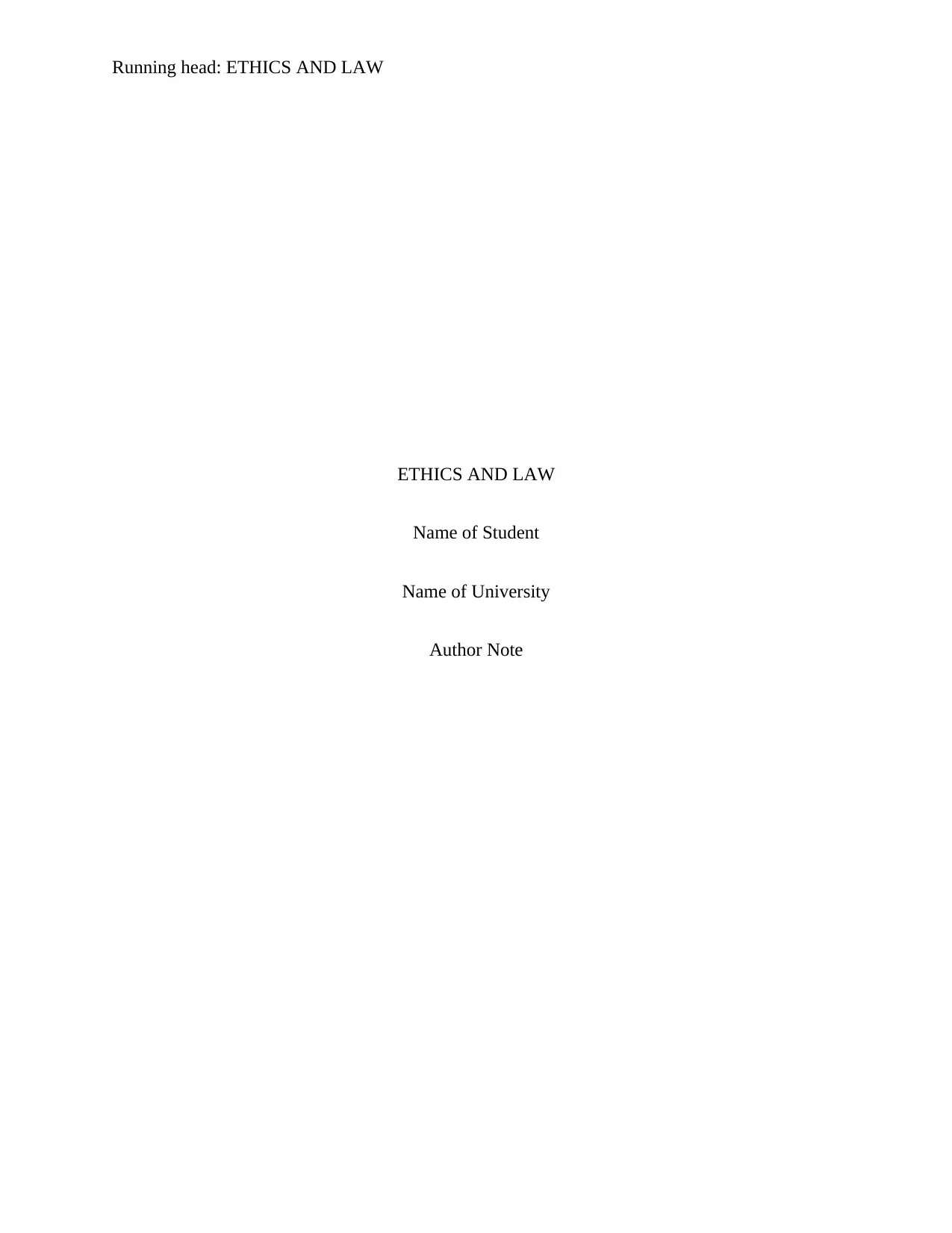
Running head: ETHICS AND LAW
ETHICS AND LAW
Name of Student
Name of University
Author Note
ETHICS AND LAW
Name of Student
Name of University
Author Note
Paraphrase This Document
Need a fresh take? Get an instant paraphrase of this document with our AI Paraphraser
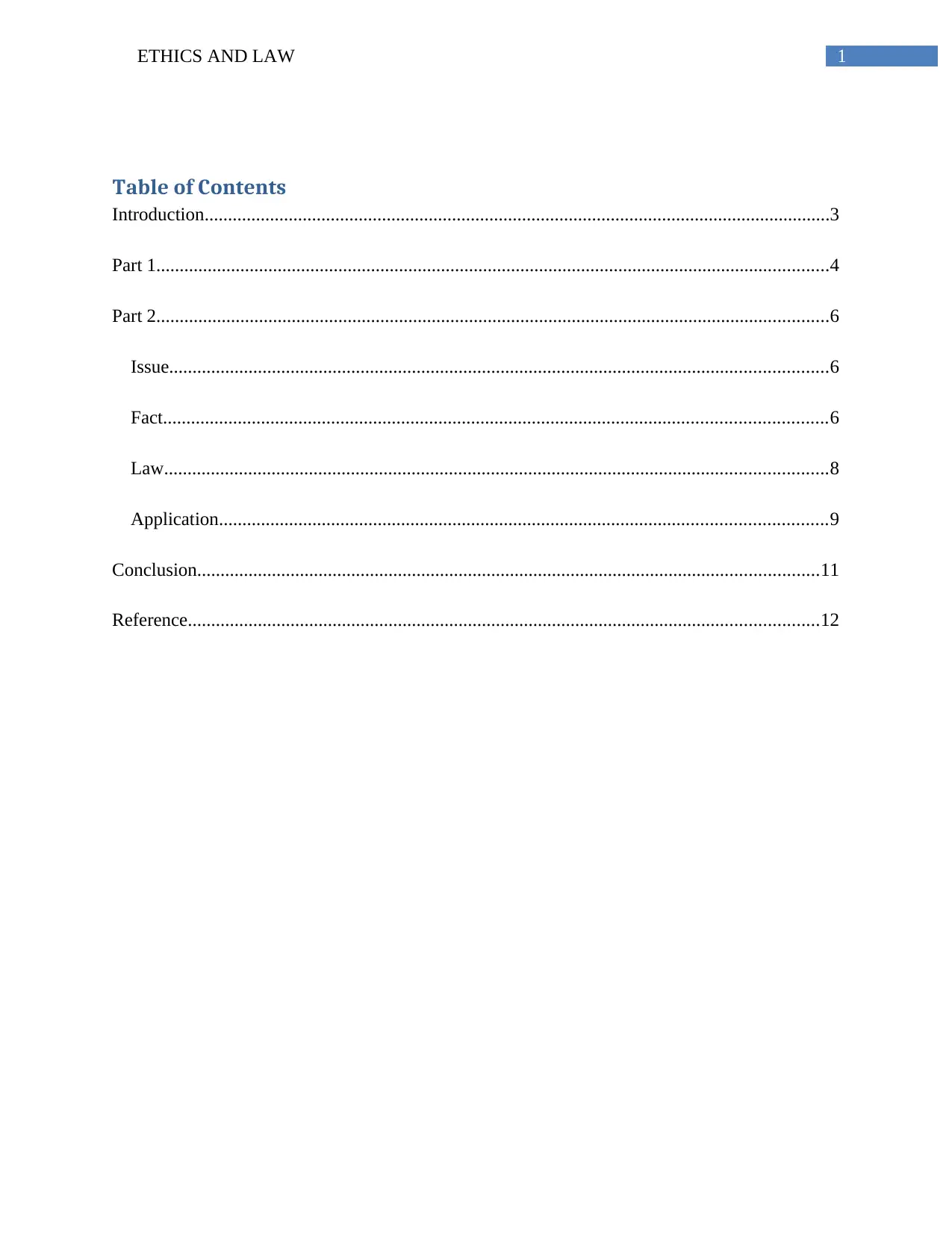
1ETHICS AND LAW
Table of Contents
Introduction......................................................................................................................................3
Part 1................................................................................................................................................4
Part 2................................................................................................................................................6
Issue.............................................................................................................................................6
Fact..............................................................................................................................................6
Law..............................................................................................................................................8
Application..................................................................................................................................9
Conclusion.....................................................................................................................................11
Reference.......................................................................................................................................12
Table of Contents
Introduction......................................................................................................................................3
Part 1................................................................................................................................................4
Part 2................................................................................................................................................6
Issue.............................................................................................................................................6
Fact..............................................................................................................................................6
Law..............................................................................................................................................8
Application..................................................................................................................................9
Conclusion.....................................................................................................................................11
Reference.......................................................................................................................................12
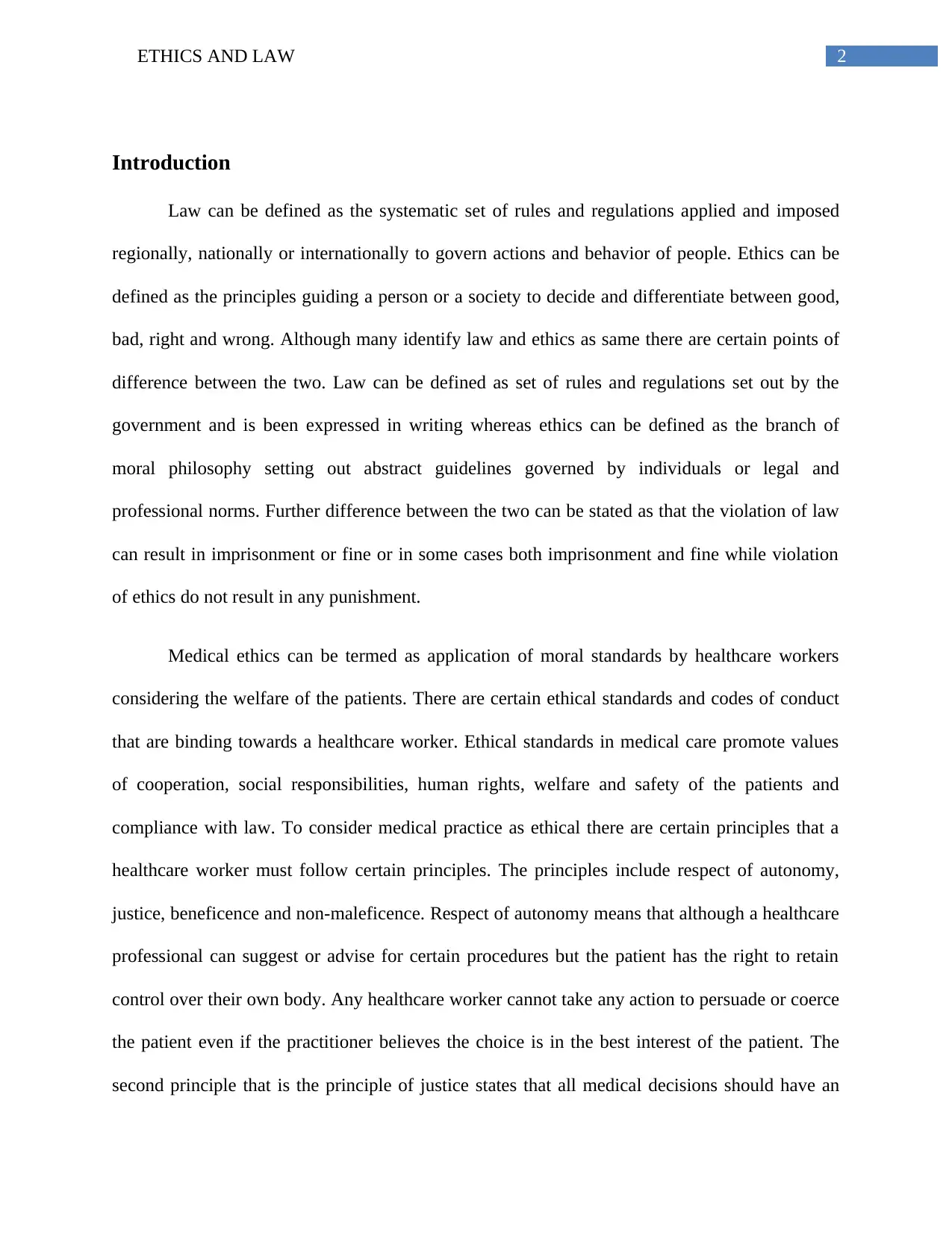
2ETHICS AND LAW
Introduction
Law can be defined as the systematic set of rules and regulations applied and imposed
regionally, nationally or internationally to govern actions and behavior of people. Ethics can be
defined as the principles guiding a person or a society to decide and differentiate between good,
bad, right and wrong. Although many identify law and ethics as same there are certain points of
difference between the two. Law can be defined as set of rules and regulations set out by the
government and is been expressed in writing whereas ethics can be defined as the branch of
moral philosophy setting out abstract guidelines governed by individuals or legal and
professional norms. Further difference between the two can be stated as that the violation of law
can result in imprisonment or fine or in some cases both imprisonment and fine while violation
of ethics do not result in any punishment.
Medical ethics can be termed as application of moral standards by healthcare workers
considering the welfare of the patients. There are certain ethical standards and codes of conduct
that are binding towards a healthcare worker. Ethical standards in medical care promote values
of cooperation, social responsibilities, human rights, welfare and safety of the patients and
compliance with law. To consider medical practice as ethical there are certain principles that a
healthcare worker must follow certain principles. The principles include respect of autonomy,
justice, beneficence and non-maleficence. Respect of autonomy means that although a healthcare
professional can suggest or advise for certain procedures but the patient has the right to retain
control over their own body. Any healthcare worker cannot take any action to persuade or coerce
the patient even if the practitioner believes the choice is in the best interest of the patient. The
second principle that is the principle of justice states that all medical decisions should have an
Introduction
Law can be defined as the systematic set of rules and regulations applied and imposed
regionally, nationally or internationally to govern actions and behavior of people. Ethics can be
defined as the principles guiding a person or a society to decide and differentiate between good,
bad, right and wrong. Although many identify law and ethics as same there are certain points of
difference between the two. Law can be defined as set of rules and regulations set out by the
government and is been expressed in writing whereas ethics can be defined as the branch of
moral philosophy setting out abstract guidelines governed by individuals or legal and
professional norms. Further difference between the two can be stated as that the violation of law
can result in imprisonment or fine or in some cases both imprisonment and fine while violation
of ethics do not result in any punishment.
Medical ethics can be termed as application of moral standards by healthcare workers
considering the welfare of the patients. There are certain ethical standards and codes of conduct
that are binding towards a healthcare worker. Ethical standards in medical care promote values
of cooperation, social responsibilities, human rights, welfare and safety of the patients and
compliance with law. To consider medical practice as ethical there are certain principles that a
healthcare worker must follow certain principles. The principles include respect of autonomy,
justice, beneficence and non-maleficence. Respect of autonomy means that although a healthcare
professional can suggest or advise for certain procedures but the patient has the right to retain
control over their own body. Any healthcare worker cannot take any action to persuade or coerce
the patient even if the practitioner believes the choice is in the best interest of the patient. The
second principle that is the principle of justice states that all medical decisions should have an
⊘ This is a preview!⊘
Do you want full access?
Subscribe today to unlock all pages.

Trusted by 1+ million students worldwide
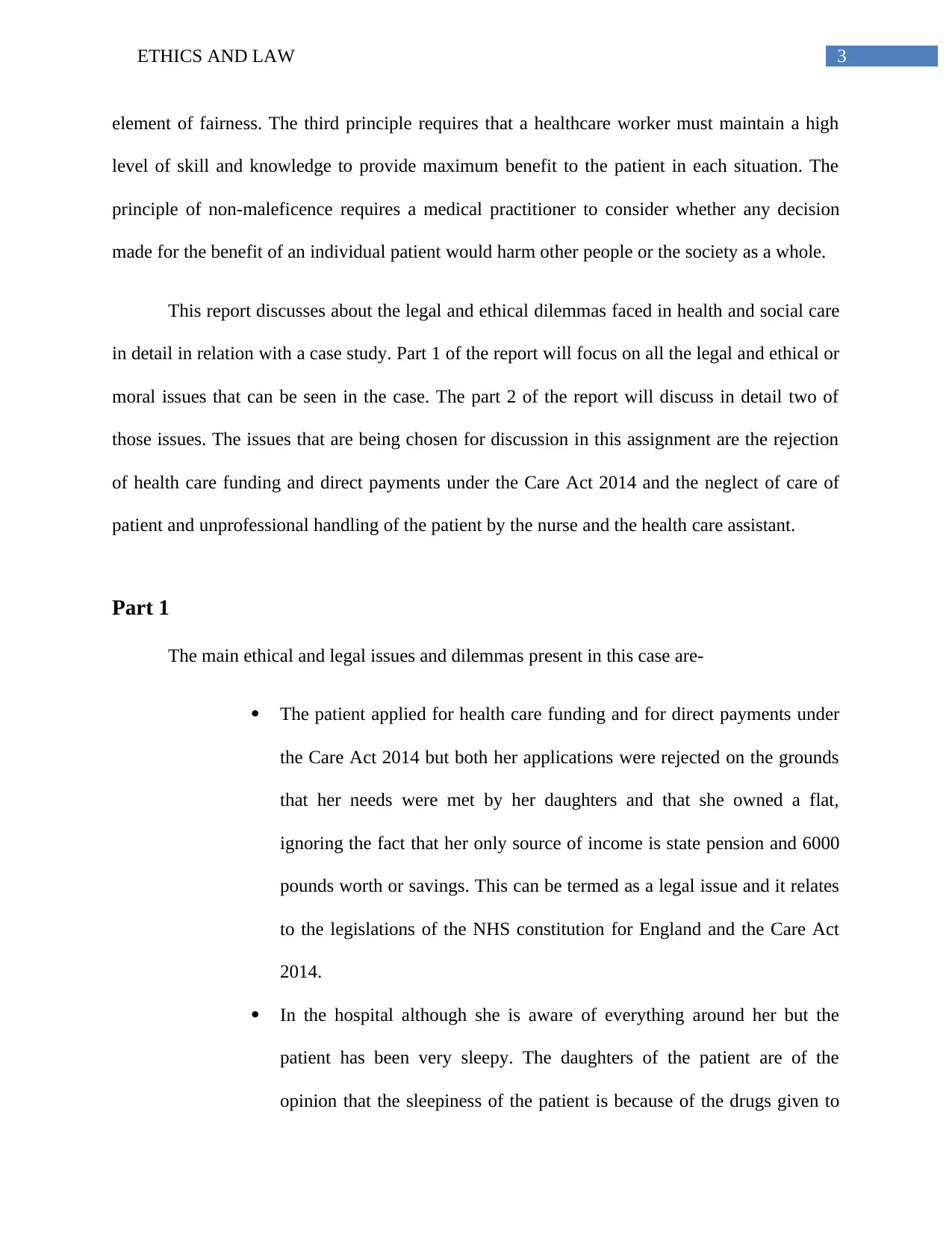
3ETHICS AND LAW
element of fairness. The third principle requires that a healthcare worker must maintain a high
level of skill and knowledge to provide maximum benefit to the patient in each situation. The
principle of non-maleficence requires a medical practitioner to consider whether any decision
made for the benefit of an individual patient would harm other people or the society as a whole.
This report discusses about the legal and ethical dilemmas faced in health and social care
in detail in relation with a case study. Part 1 of the report will focus on all the legal and ethical or
moral issues that can be seen in the case. The part 2 of the report will discuss in detail two of
those issues. The issues that are being chosen for discussion in this assignment are the rejection
of health care funding and direct payments under the Care Act 2014 and the neglect of care of
patient and unprofessional handling of the patient by the nurse and the health care assistant.
Part 1
The main ethical and legal issues and dilemmas present in this case are-
The patient applied for health care funding and for direct payments under
the Care Act 2014 but both her applications were rejected on the grounds
that her needs were met by her daughters and that she owned a flat,
ignoring the fact that her only source of income is state pension and 6000
pounds worth or savings. This can be termed as a legal issue and it relates
to the legislations of the NHS constitution for England and the Care Act
2014.
In the hospital although she is aware of everything around her but the
patient has been very sleepy. The daughters of the patient are of the
opinion that the sleepiness of the patient is because of the drugs given to
element of fairness. The third principle requires that a healthcare worker must maintain a high
level of skill and knowledge to provide maximum benefit to the patient in each situation. The
principle of non-maleficence requires a medical practitioner to consider whether any decision
made for the benefit of an individual patient would harm other people or the society as a whole.
This report discusses about the legal and ethical dilemmas faced in health and social care
in detail in relation with a case study. Part 1 of the report will focus on all the legal and ethical or
moral issues that can be seen in the case. The part 2 of the report will discuss in detail two of
those issues. The issues that are being chosen for discussion in this assignment are the rejection
of health care funding and direct payments under the Care Act 2014 and the neglect of care of
patient and unprofessional handling of the patient by the nurse and the health care assistant.
Part 1
The main ethical and legal issues and dilemmas present in this case are-
The patient applied for health care funding and for direct payments under
the Care Act 2014 but both her applications were rejected on the grounds
that her needs were met by her daughters and that she owned a flat,
ignoring the fact that her only source of income is state pension and 6000
pounds worth or savings. This can be termed as a legal issue and it relates
to the legislations of the NHS constitution for England and the Care Act
2014.
In the hospital although she is aware of everything around her but the
patient has been very sleepy. The daughters of the patient are of the
opinion that the sleepiness of the patient is because of the drugs given to
Paraphrase This Document
Need a fresh take? Get an instant paraphrase of this document with our AI Paraphraser
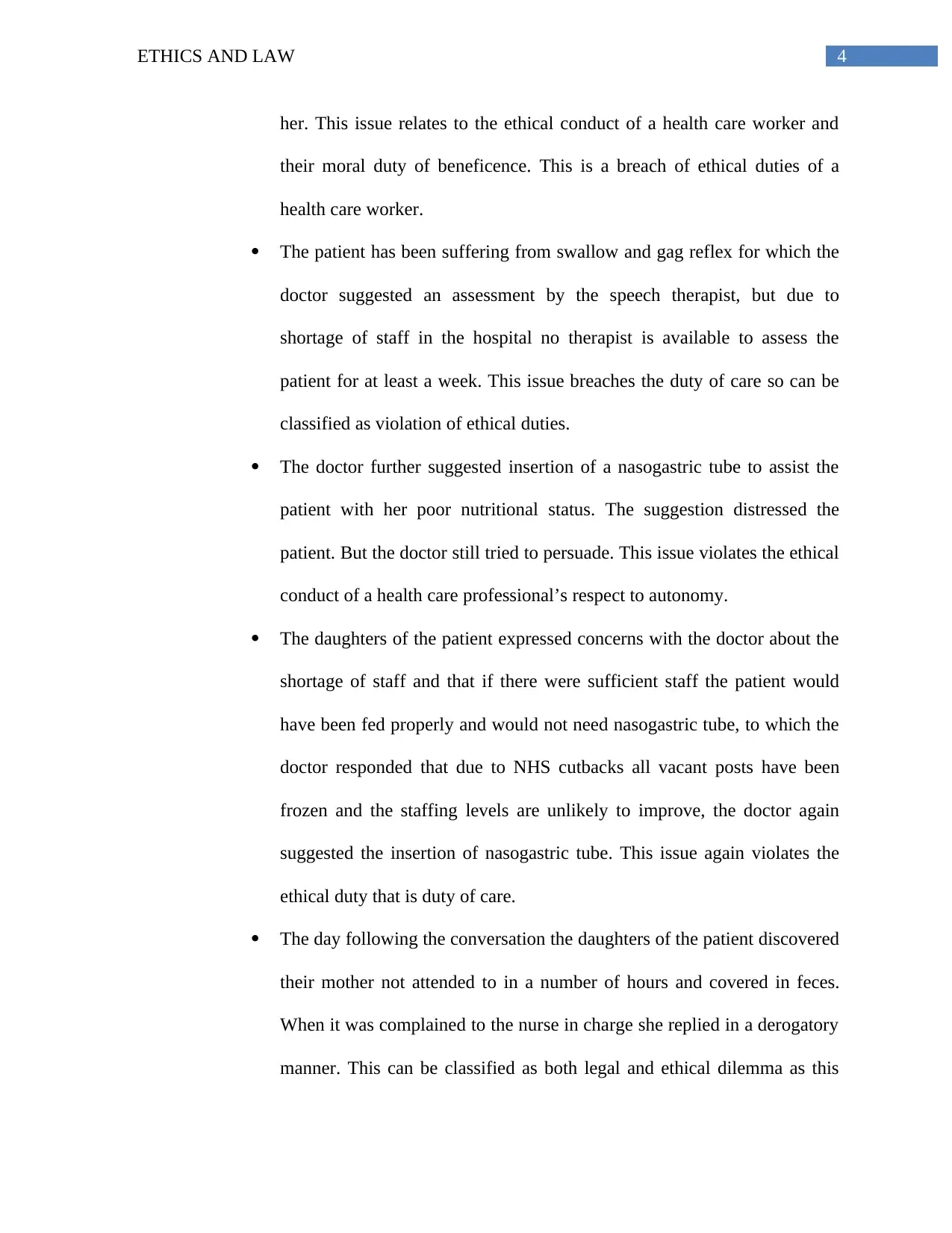
4ETHICS AND LAW
her. This issue relates to the ethical conduct of a health care worker and
their moral duty of beneficence. This is a breach of ethical duties of a
health care worker.
The patient has been suffering from swallow and gag reflex for which the
doctor suggested an assessment by the speech therapist, but due to
shortage of staff in the hospital no therapist is available to assess the
patient for at least a week. This issue breaches the duty of care so can be
classified as violation of ethical duties.
The doctor further suggested insertion of a nasogastric tube to assist the
patient with her poor nutritional status. The suggestion distressed the
patient. But the doctor still tried to persuade. This issue violates the ethical
conduct of a health care professional’s respect to autonomy.
The daughters of the patient expressed concerns with the doctor about the
shortage of staff and that if there were sufficient staff the patient would
have been fed properly and would not need nasogastric tube, to which the
doctor responded that due to NHS cutbacks all vacant posts have been
frozen and the staffing levels are unlikely to improve, the doctor again
suggested the insertion of nasogastric tube. This issue again violates the
ethical duty that is duty of care.
The day following the conversation the daughters of the patient discovered
their mother not attended to in a number of hours and covered in feces.
When it was complained to the nurse in charge she replied in a derogatory
manner. This can be classified as both legal and ethical dilemma as this
her. This issue relates to the ethical conduct of a health care worker and
their moral duty of beneficence. This is a breach of ethical duties of a
health care worker.
The patient has been suffering from swallow and gag reflex for which the
doctor suggested an assessment by the speech therapist, but due to
shortage of staff in the hospital no therapist is available to assess the
patient for at least a week. This issue breaches the duty of care so can be
classified as violation of ethical duties.
The doctor further suggested insertion of a nasogastric tube to assist the
patient with her poor nutritional status. The suggestion distressed the
patient. But the doctor still tried to persuade. This issue violates the ethical
conduct of a health care professional’s respect to autonomy.
The daughters of the patient expressed concerns with the doctor about the
shortage of staff and that if there were sufficient staff the patient would
have been fed properly and would not need nasogastric tube, to which the
doctor responded that due to NHS cutbacks all vacant posts have been
frozen and the staffing levels are unlikely to improve, the doctor again
suggested the insertion of nasogastric tube. This issue again violates the
ethical duty that is duty of care.
The day following the conversation the daughters of the patient discovered
their mother not attended to in a number of hours and covered in feces.
When it was complained to the nurse in charge she replied in a derogatory
manner. This can be classified as both legal and ethical dilemma as this
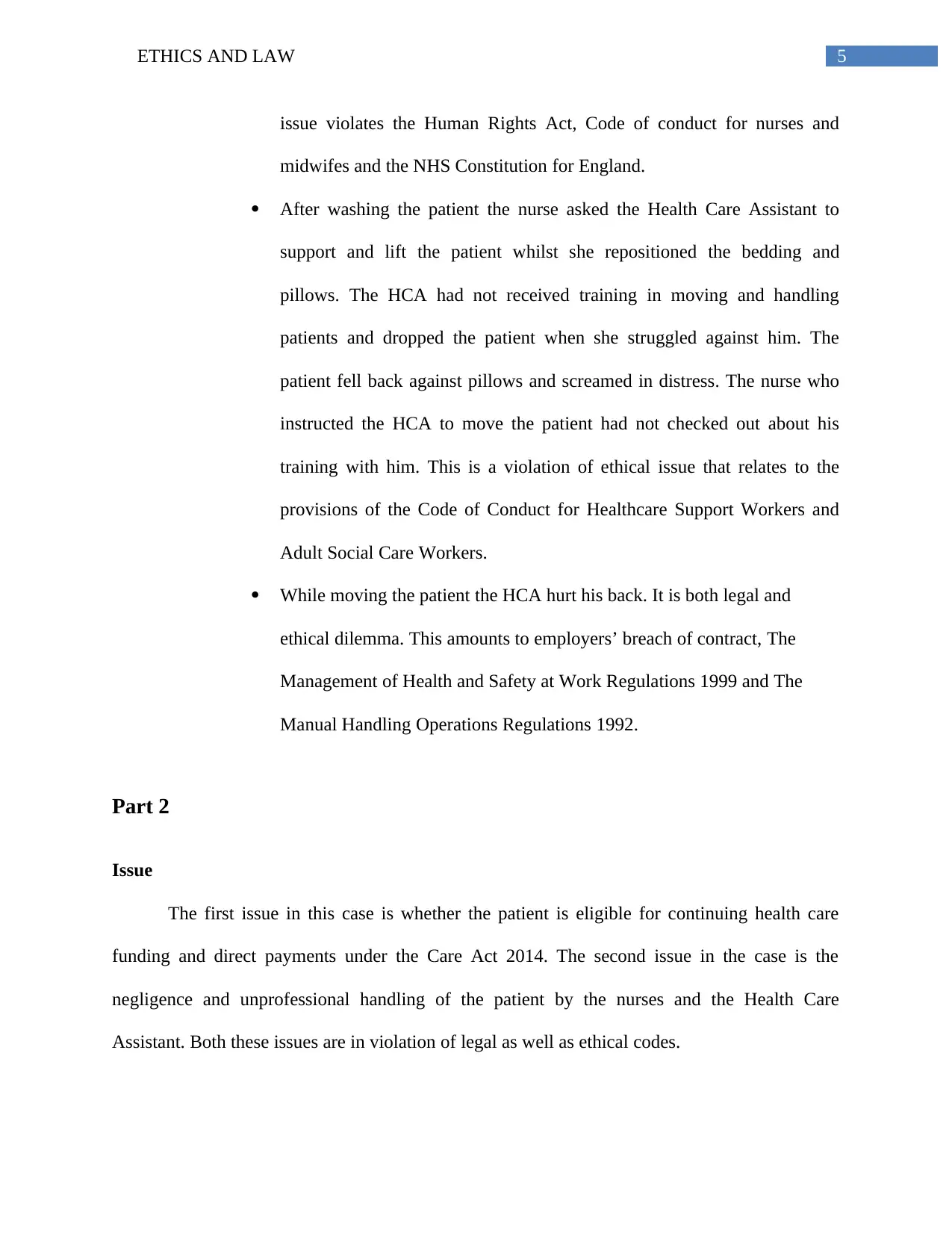
5ETHICS AND LAW
issue violates the Human Rights Act, Code of conduct for nurses and
midwifes and the NHS Constitution for England.
After washing the patient the nurse asked the Health Care Assistant to
support and lift the patient whilst she repositioned the bedding and
pillows. The HCA had not received training in moving and handling
patients and dropped the patient when she struggled against him. The
patient fell back against pillows and screamed in distress. The nurse who
instructed the HCA to move the patient had not checked out about his
training with him. This is a violation of ethical issue that relates to the
provisions of the Code of Conduct for Healthcare Support Workers and
Adult Social Care Workers.
While moving the patient the HCA hurt his back. It is both legal and
ethical dilemma. This amounts to employers’ breach of contract, The
Management of Health and Safety at Work Regulations 1999 and The
Manual Handling Operations Regulations 1992.
Part 2
Issue
The first issue in this case is whether the patient is eligible for continuing health care
funding and direct payments under the Care Act 2014. The second issue in the case is the
negligence and unprofessional handling of the patient by the nurses and the Health Care
Assistant. Both these issues are in violation of legal as well as ethical codes.
issue violates the Human Rights Act, Code of conduct for nurses and
midwifes and the NHS Constitution for England.
After washing the patient the nurse asked the Health Care Assistant to
support and lift the patient whilst she repositioned the bedding and
pillows. The HCA had not received training in moving and handling
patients and dropped the patient when she struggled against him. The
patient fell back against pillows and screamed in distress. The nurse who
instructed the HCA to move the patient had not checked out about his
training with him. This is a violation of ethical issue that relates to the
provisions of the Code of Conduct for Healthcare Support Workers and
Adult Social Care Workers.
While moving the patient the HCA hurt his back. It is both legal and
ethical dilemma. This amounts to employers’ breach of contract, The
Management of Health and Safety at Work Regulations 1999 and The
Manual Handling Operations Regulations 1992.
Part 2
Issue
The first issue in this case is whether the patient is eligible for continuing health care
funding and direct payments under the Care Act 2014. The second issue in the case is the
negligence and unprofessional handling of the patient by the nurses and the Health Care
Assistant. Both these issues are in violation of legal as well as ethical codes.
⊘ This is a preview!⊘
Do you want full access?
Subscribe today to unlock all pages.

Trusted by 1+ million students worldwide
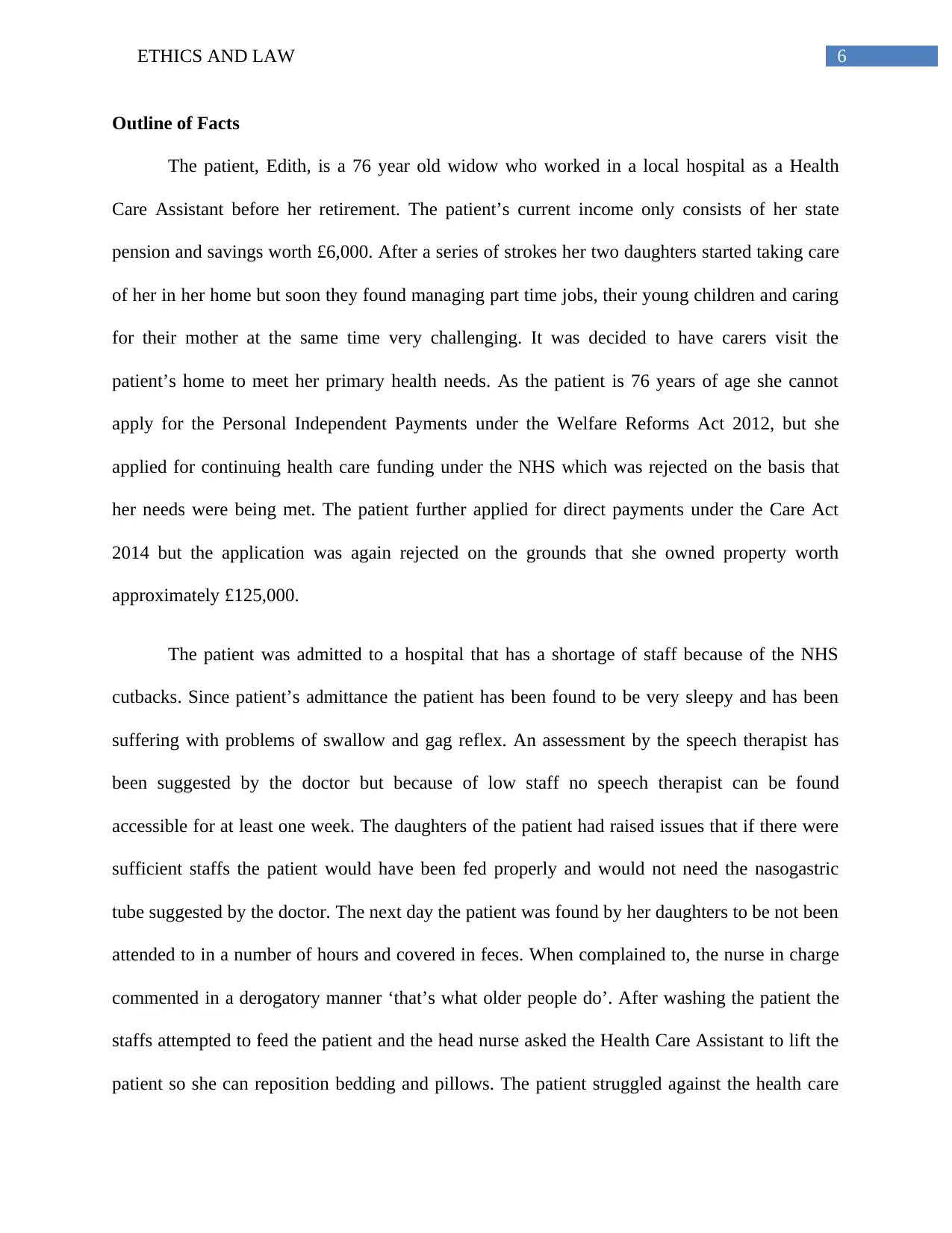
6ETHICS AND LAW
Outline of Facts
The patient, Edith, is a 76 year old widow who worked in a local hospital as a Health
Care Assistant before her retirement. The patient’s current income only consists of her state
pension and savings worth £6,000. After a series of strokes her two daughters started taking care
of her in her home but soon they found managing part time jobs, their young children and caring
for their mother at the same time very challenging. It was decided to have carers visit the
patient’s home to meet her primary health needs. As the patient is 76 years of age she cannot
apply for the Personal Independent Payments under the Welfare Reforms Act 2012, but she
applied for continuing health care funding under the NHS which was rejected on the basis that
her needs were being met. The patient further applied for direct payments under the Care Act
2014 but the application was again rejected on the grounds that she owned property worth
approximately £125,000.
The patient was admitted to a hospital that has a shortage of staff because of the NHS
cutbacks. Since patient’s admittance the patient has been found to be very sleepy and has been
suffering with problems of swallow and gag reflex. An assessment by the speech therapist has
been suggested by the doctor but because of low staff no speech therapist can be found
accessible for at least one week. The daughters of the patient had raised issues that if there were
sufficient staffs the patient would have been fed properly and would not need the nasogastric
tube suggested by the doctor. The next day the patient was found by her daughters to be not been
attended to in a number of hours and covered in feces. When complained to, the nurse in charge
commented in a derogatory manner ‘that’s what older people do’. After washing the patient the
staffs attempted to feed the patient and the head nurse asked the Health Care Assistant to lift the
patient so she can reposition bedding and pillows. The patient struggled against the health care
Outline of Facts
The patient, Edith, is a 76 year old widow who worked in a local hospital as a Health
Care Assistant before her retirement. The patient’s current income only consists of her state
pension and savings worth £6,000. After a series of strokes her two daughters started taking care
of her in her home but soon they found managing part time jobs, their young children and caring
for their mother at the same time very challenging. It was decided to have carers visit the
patient’s home to meet her primary health needs. As the patient is 76 years of age she cannot
apply for the Personal Independent Payments under the Welfare Reforms Act 2012, but she
applied for continuing health care funding under the NHS which was rejected on the basis that
her needs were being met. The patient further applied for direct payments under the Care Act
2014 but the application was again rejected on the grounds that she owned property worth
approximately £125,000.
The patient was admitted to a hospital that has a shortage of staff because of the NHS
cutbacks. Since patient’s admittance the patient has been found to be very sleepy and has been
suffering with problems of swallow and gag reflex. An assessment by the speech therapist has
been suggested by the doctor but because of low staff no speech therapist can be found
accessible for at least one week. The daughters of the patient had raised issues that if there were
sufficient staffs the patient would have been fed properly and would not need the nasogastric
tube suggested by the doctor. The next day the patient was found by her daughters to be not been
attended to in a number of hours and covered in feces. When complained to, the nurse in charge
commented in a derogatory manner ‘that’s what older people do’. After washing the patient the
staffs attempted to feed the patient and the head nurse asked the Health Care Assistant to lift the
patient so she can reposition bedding and pillows. The patient struggled against the health care
Paraphrase This Document
Need a fresh take? Get an instant paraphrase of this document with our AI Paraphraser
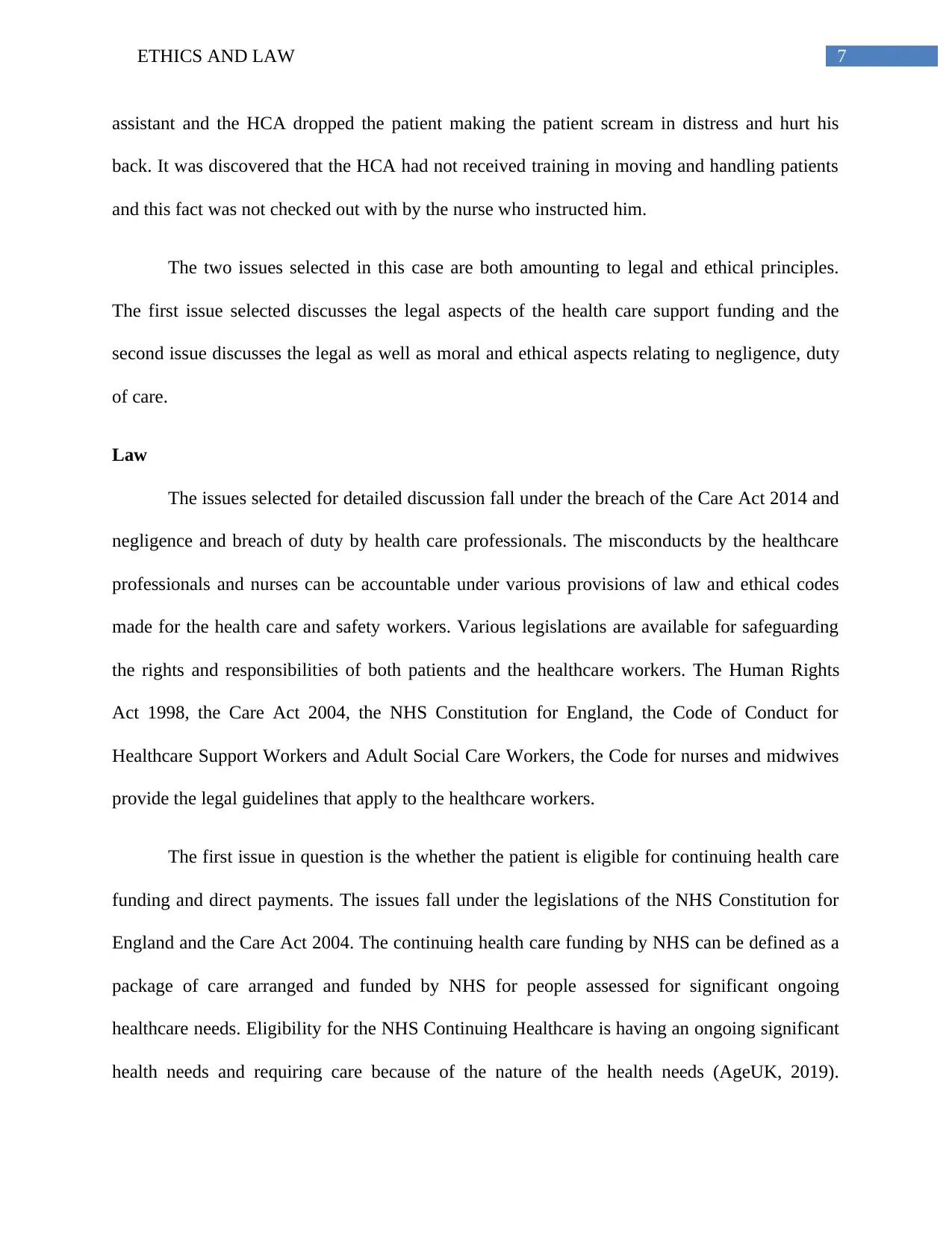
7ETHICS AND LAW
assistant and the HCA dropped the patient making the patient scream in distress and hurt his
back. It was discovered that the HCA had not received training in moving and handling patients
and this fact was not checked out with by the nurse who instructed him.
The two issues selected in this case are both amounting to legal and ethical principles.
The first issue selected discusses the legal aspects of the health care support funding and the
second issue discusses the legal as well as moral and ethical aspects relating to negligence, duty
of care.
Law
The issues selected for detailed discussion fall under the breach of the Care Act 2014 and
negligence and breach of duty by health care professionals. The misconducts by the healthcare
professionals and nurses can be accountable under various provisions of law and ethical codes
made for the health care and safety workers. Various legislations are available for safeguarding
the rights and responsibilities of both patients and the healthcare workers. The Human Rights
Act 1998, the Care Act 2004, the NHS Constitution for England, the Code of Conduct for
Healthcare Support Workers and Adult Social Care Workers, the Code for nurses and midwives
provide the legal guidelines that apply to the healthcare workers.
The first issue in question is the whether the patient is eligible for continuing health care
funding and direct payments. The issues fall under the legislations of the NHS Constitution for
England and the Care Act 2004. The continuing health care funding by NHS can be defined as a
package of care arranged and funded by NHS for people assessed for significant ongoing
healthcare needs. Eligibility for the NHS Continuing Healthcare is having an ongoing significant
health needs and requiring care because of the nature of the health needs (AgeUK, 2019).
assistant and the HCA dropped the patient making the patient scream in distress and hurt his
back. It was discovered that the HCA had not received training in moving and handling patients
and this fact was not checked out with by the nurse who instructed him.
The two issues selected in this case are both amounting to legal and ethical principles.
The first issue selected discusses the legal aspects of the health care support funding and the
second issue discusses the legal as well as moral and ethical aspects relating to negligence, duty
of care.
Law
The issues selected for detailed discussion fall under the breach of the Care Act 2014 and
negligence and breach of duty by health care professionals. The misconducts by the healthcare
professionals and nurses can be accountable under various provisions of law and ethical codes
made for the health care and safety workers. Various legislations are available for safeguarding
the rights and responsibilities of both patients and the healthcare workers. The Human Rights
Act 1998, the Care Act 2004, the NHS Constitution for England, the Code of Conduct for
Healthcare Support Workers and Adult Social Care Workers, the Code for nurses and midwives
provide the legal guidelines that apply to the healthcare workers.
The first issue in question is the whether the patient is eligible for continuing health care
funding and direct payments. The issues fall under the legislations of the NHS Constitution for
England and the Care Act 2004. The continuing health care funding by NHS can be defined as a
package of care arranged and funded by NHS for people assessed for significant ongoing
healthcare needs. Eligibility for the NHS Continuing Healthcare is having an ongoing significant
health needs and requiring care because of the nature of the health needs (AgeUK, 2019).
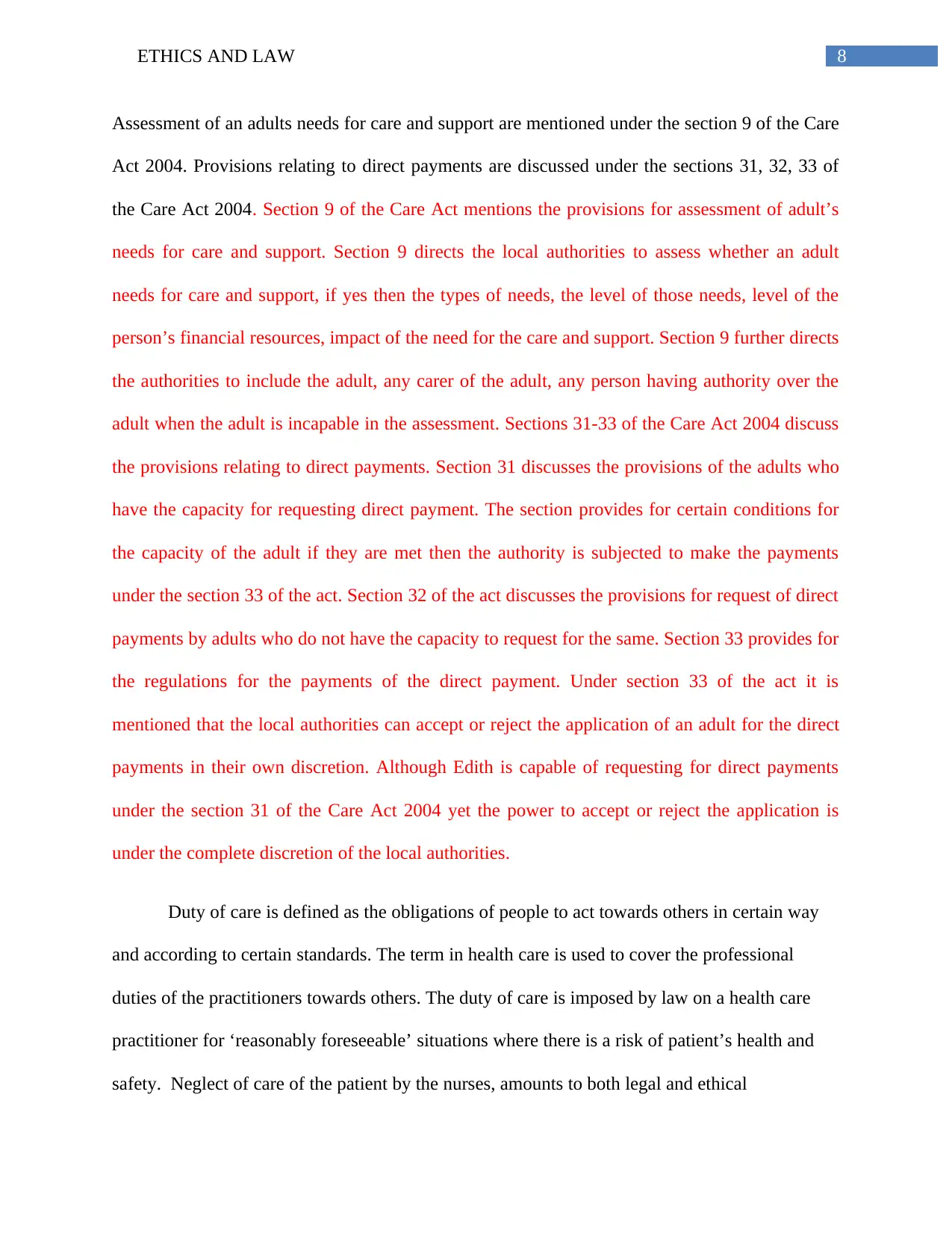
8ETHICS AND LAW
Assessment of an adults needs for care and support are mentioned under the section 9 of the Care
Act 2004. Provisions relating to direct payments are discussed under the sections 31, 32, 33 of
the Care Act 2004. Section 9 of the Care Act mentions the provisions for assessment of adult’s
needs for care and support. Section 9 directs the local authorities to assess whether an adult
needs for care and support, if yes then the types of needs, the level of those needs, level of the
person’s financial resources, impact of the need for the care and support. Section 9 further directs
the authorities to include the adult, any carer of the adult, any person having authority over the
adult when the adult is incapable in the assessment. Sections 31-33 of the Care Act 2004 discuss
the provisions relating to direct payments. Section 31 discusses the provisions of the adults who
have the capacity for requesting direct payment. The section provides for certain conditions for
the capacity of the adult if they are met then the authority is subjected to make the payments
under the section 33 of the act. Section 32 of the act discusses the provisions for request of direct
payments by adults who do not have the capacity to request for the same. Section 33 provides for
the regulations for the payments of the direct payment. Under section 33 of the act it is
mentioned that the local authorities can accept or reject the application of an adult for the direct
payments in their own discretion. Although Edith is capable of requesting for direct payments
under the section 31 of the Care Act 2004 yet the power to accept or reject the application is
under the complete discretion of the local authorities.
Duty of care is defined as the obligations of people to act towards others in certain way
and according to certain standards. The term in health care is used to cover the professional
duties of the practitioners towards others. The duty of care is imposed by law on a health care
practitioner for ‘reasonably foreseeable’ situations where there is a risk of patient’s health and
safety. Neglect of care of the patient by the nurses, amounts to both legal and ethical
Assessment of an adults needs for care and support are mentioned under the section 9 of the Care
Act 2004. Provisions relating to direct payments are discussed under the sections 31, 32, 33 of
the Care Act 2004. Section 9 of the Care Act mentions the provisions for assessment of adult’s
needs for care and support. Section 9 directs the local authorities to assess whether an adult
needs for care and support, if yes then the types of needs, the level of those needs, level of the
person’s financial resources, impact of the need for the care and support. Section 9 further directs
the authorities to include the adult, any carer of the adult, any person having authority over the
adult when the adult is incapable in the assessment. Sections 31-33 of the Care Act 2004 discuss
the provisions relating to direct payments. Section 31 discusses the provisions of the adults who
have the capacity for requesting direct payment. The section provides for certain conditions for
the capacity of the adult if they are met then the authority is subjected to make the payments
under the section 33 of the act. Section 32 of the act discusses the provisions for request of direct
payments by adults who do not have the capacity to request for the same. Section 33 provides for
the regulations for the payments of the direct payment. Under section 33 of the act it is
mentioned that the local authorities can accept or reject the application of an adult for the direct
payments in their own discretion. Although Edith is capable of requesting for direct payments
under the section 31 of the Care Act 2004 yet the power to accept or reject the application is
under the complete discretion of the local authorities.
Duty of care is defined as the obligations of people to act towards others in certain way
and according to certain standards. The term in health care is used to cover the professional
duties of the practitioners towards others. The duty of care is imposed by law on a health care
practitioner for ‘reasonably foreseeable’ situations where there is a risk of patient’s health and
safety. Neglect of care of the patient by the nurses, amounts to both legal and ethical
⊘ This is a preview!⊘
Do you want full access?
Subscribe today to unlock all pages.

Trusted by 1+ million students worldwide
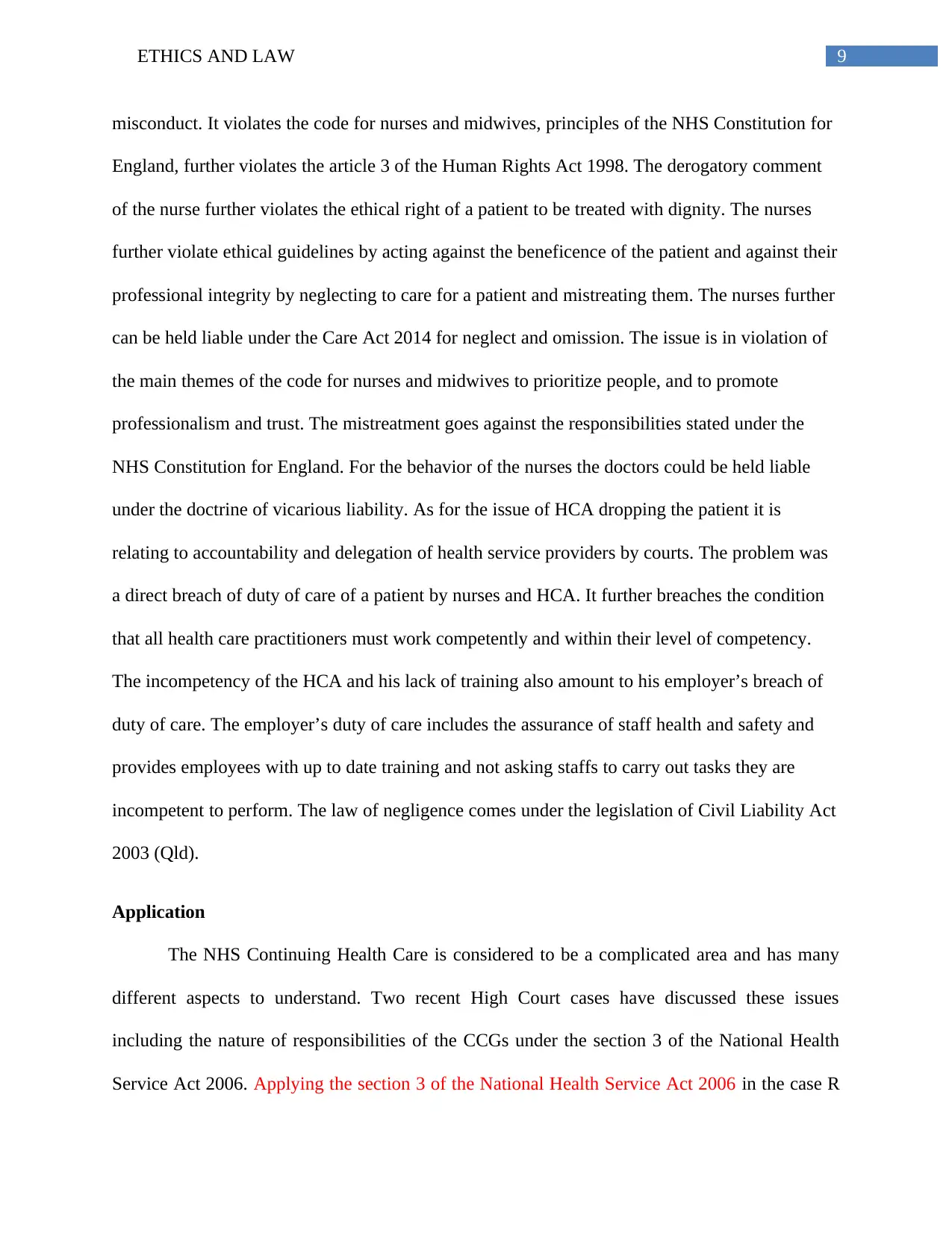
9ETHICS AND LAW
misconduct. It violates the code for nurses and midwives, principles of the NHS Constitution for
England, further violates the article 3 of the Human Rights Act 1998. The derogatory comment
of the nurse further violates the ethical right of a patient to be treated with dignity. The nurses
further violate ethical guidelines by acting against the beneficence of the patient and against their
professional integrity by neglecting to care for a patient and mistreating them. The nurses further
can be held liable under the Care Act 2014 for neglect and omission. The issue is in violation of
the main themes of the code for nurses and midwives to prioritize people, and to promote
professionalism and trust. The mistreatment goes against the responsibilities stated under the
NHS Constitution for England. For the behavior of the nurses the doctors could be held liable
under the doctrine of vicarious liability. As for the issue of HCA dropping the patient it is
relating to accountability and delegation of health service providers by courts. The problem was
a direct breach of duty of care of a patient by nurses and HCA. It further breaches the condition
that all health care practitioners must work competently and within their level of competency.
The incompetency of the HCA and his lack of training also amount to his employer’s breach of
duty of care. The employer’s duty of care includes the assurance of staff health and safety and
provides employees with up to date training and not asking staffs to carry out tasks they are
incompetent to perform. The law of negligence comes under the legislation of Civil Liability Act
2003 (Qld).
Application
The NHS Continuing Health Care is considered to be a complicated area and has many
different aspects to understand. Two recent High Court cases have discussed these issues
including the nature of responsibilities of the CCGs under the section 3 of the National Health
Service Act 2006. Applying the section 3 of the National Health Service Act 2006 in the case R
misconduct. It violates the code for nurses and midwives, principles of the NHS Constitution for
England, further violates the article 3 of the Human Rights Act 1998. The derogatory comment
of the nurse further violates the ethical right of a patient to be treated with dignity. The nurses
further violate ethical guidelines by acting against the beneficence of the patient and against their
professional integrity by neglecting to care for a patient and mistreating them. The nurses further
can be held liable under the Care Act 2014 for neglect and omission. The issue is in violation of
the main themes of the code for nurses and midwives to prioritize people, and to promote
professionalism and trust. The mistreatment goes against the responsibilities stated under the
NHS Constitution for England. For the behavior of the nurses the doctors could be held liable
under the doctrine of vicarious liability. As for the issue of HCA dropping the patient it is
relating to accountability and delegation of health service providers by courts. The problem was
a direct breach of duty of care of a patient by nurses and HCA. It further breaches the condition
that all health care practitioners must work competently and within their level of competency.
The incompetency of the HCA and his lack of training also amount to his employer’s breach of
duty of care. The employer’s duty of care includes the assurance of staff health and safety and
provides employees with up to date training and not asking staffs to carry out tasks they are
incompetent to perform. The law of negligence comes under the legislation of Civil Liability Act
2003 (Qld).
Application
The NHS Continuing Health Care is considered to be a complicated area and has many
different aspects to understand. Two recent High Court cases have discussed these issues
including the nature of responsibilities of the CCGs under the section 3 of the National Health
Service Act 2006. Applying the section 3 of the National Health Service Act 2006 in the case R
Paraphrase This Document
Need a fresh take? Get an instant paraphrase of this document with our AI Paraphraser
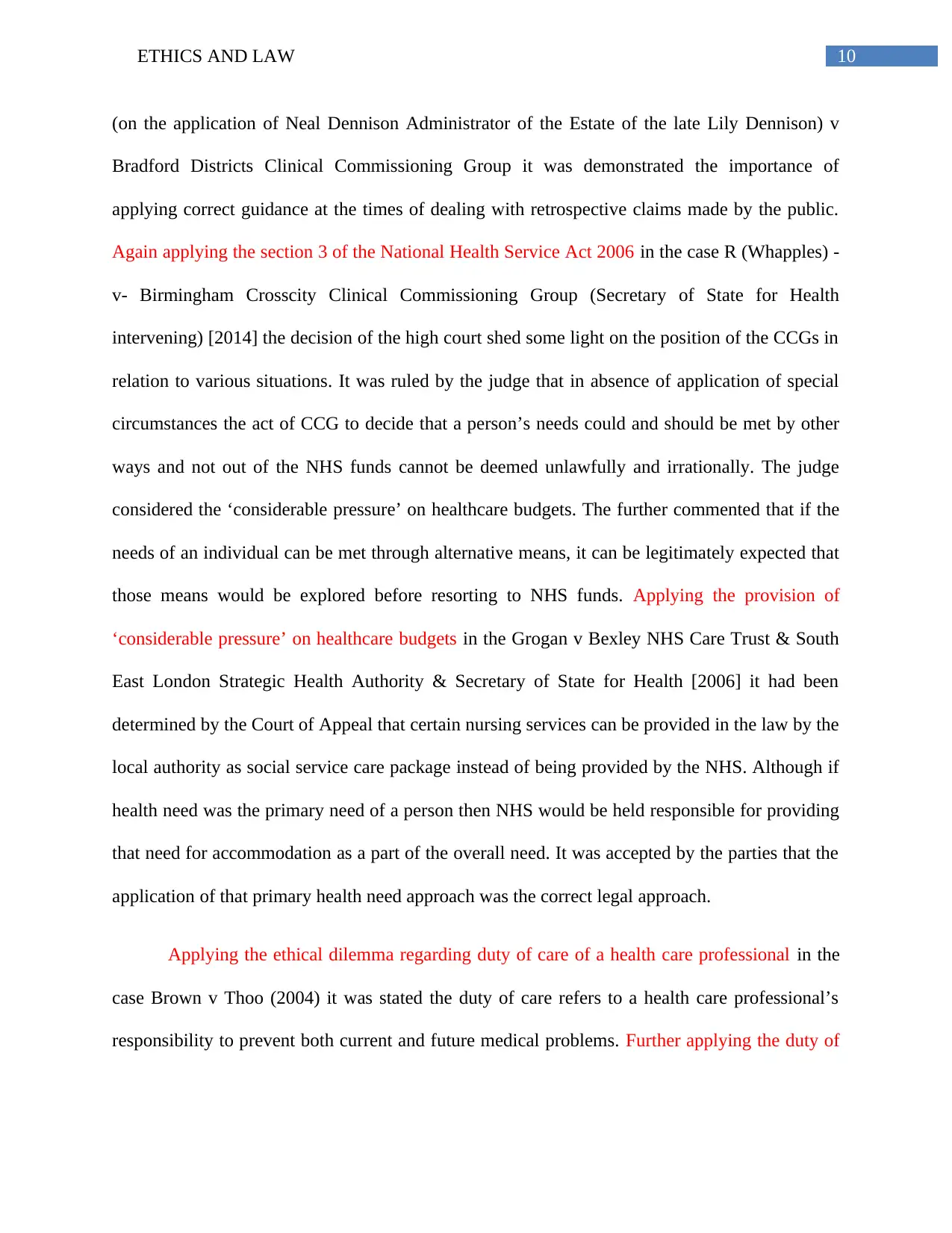
10ETHICS AND LAW
(on the application of Neal Dennison Administrator of the Estate of the late Lily Dennison) v
Bradford Districts Clinical Commissioning Group it was demonstrated the importance of
applying correct guidance at the times of dealing with retrospective claims made by the public.
Again applying the section 3 of the National Health Service Act 2006 in the case R (Whapples) -
v- Birmingham Crosscity Clinical Commissioning Group (Secretary of State for Health
intervening) [2014] the decision of the high court shed some light on the position of the CCGs in
relation to various situations. It was ruled by the judge that in absence of application of special
circumstances the act of CCG to decide that a person’s needs could and should be met by other
ways and not out of the NHS funds cannot be deemed unlawfully and irrationally. The judge
considered the ‘considerable pressure’ on healthcare budgets. The further commented that if the
needs of an individual can be met through alternative means, it can be legitimately expected that
those means would be explored before resorting to NHS funds. Applying the provision of
‘considerable pressure’ on healthcare budgets in the Grogan v Bexley NHS Care Trust & South
East London Strategic Health Authority & Secretary of State for Health [2006] it had been
determined by the Court of Appeal that certain nursing services can be provided in the law by the
local authority as social service care package instead of being provided by the NHS. Although if
health need was the primary need of a person then NHS would be held responsible for providing
that need for accommodation as a part of the overall need. It was accepted by the parties that the
application of that primary health need approach was the correct legal approach.
Applying the ethical dilemma regarding duty of care of a health care professional in the
case Brown v Thoo (2004) it was stated the duty of care refers to a health care professional’s
responsibility to prevent both current and future medical problems. Further applying the duty of
(on the application of Neal Dennison Administrator of the Estate of the late Lily Dennison) v
Bradford Districts Clinical Commissioning Group it was demonstrated the importance of
applying correct guidance at the times of dealing with retrospective claims made by the public.
Again applying the section 3 of the National Health Service Act 2006 in the case R (Whapples) -
v- Birmingham Crosscity Clinical Commissioning Group (Secretary of State for Health
intervening) [2014] the decision of the high court shed some light on the position of the CCGs in
relation to various situations. It was ruled by the judge that in absence of application of special
circumstances the act of CCG to decide that a person’s needs could and should be met by other
ways and not out of the NHS funds cannot be deemed unlawfully and irrationally. The judge
considered the ‘considerable pressure’ on healthcare budgets. The further commented that if the
needs of an individual can be met through alternative means, it can be legitimately expected that
those means would be explored before resorting to NHS funds. Applying the provision of
‘considerable pressure’ on healthcare budgets in the Grogan v Bexley NHS Care Trust & South
East London Strategic Health Authority & Secretary of State for Health [2006] it had been
determined by the Court of Appeal that certain nursing services can be provided in the law by the
local authority as social service care package instead of being provided by the NHS. Although if
health need was the primary need of a person then NHS would be held responsible for providing
that need for accommodation as a part of the overall need. It was accepted by the parties that the
application of that primary health need approach was the correct legal approach.
Applying the ethical dilemma regarding duty of care of a health care professional in the
case Brown v Thoo (2004) it was stated the duty of care refers to a health care professional’s
responsibility to prevent both current and future medical problems. Further applying the duty of
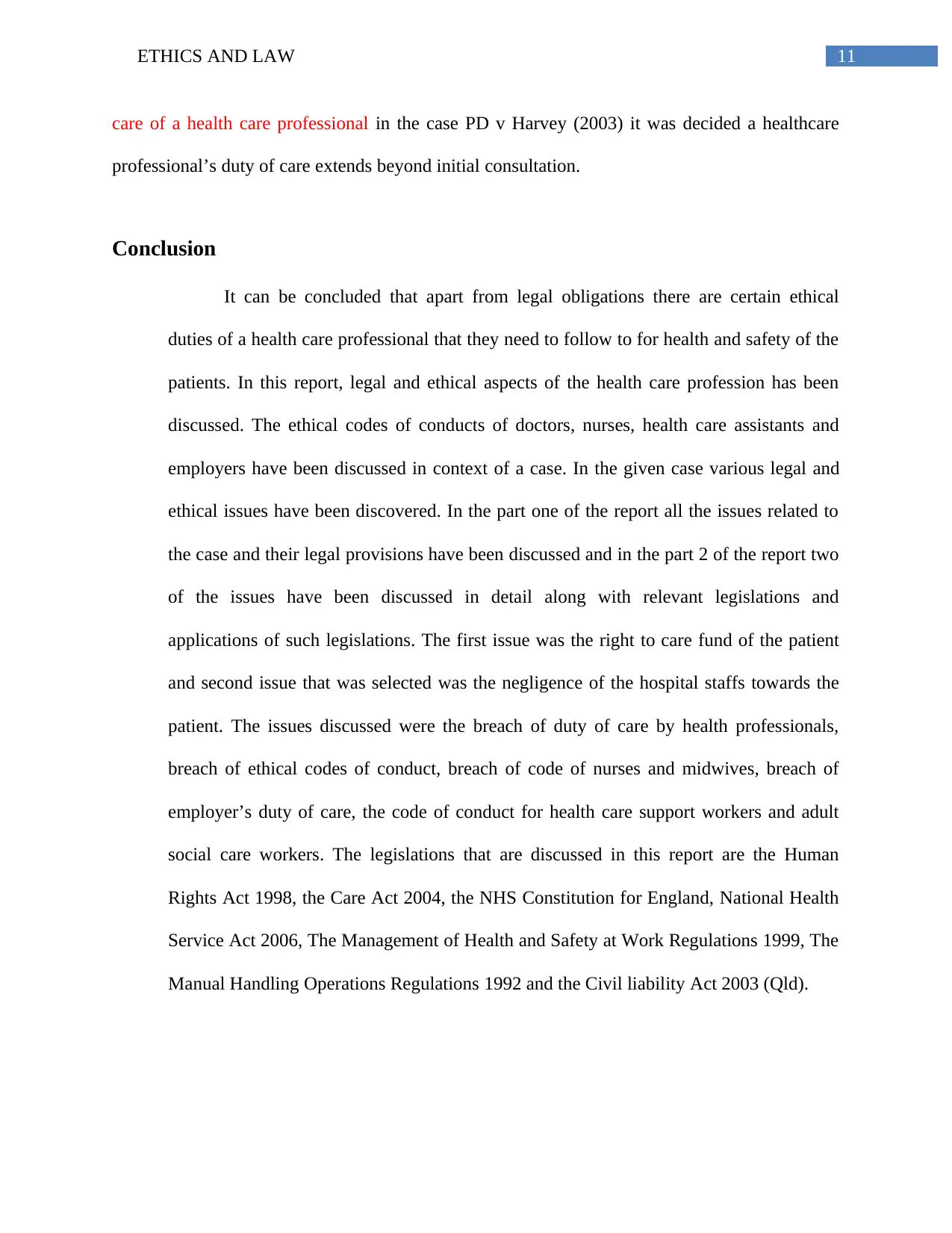
11ETHICS AND LAW
care of a health care professional in the case PD v Harvey (2003) it was decided a healthcare
professional’s duty of care extends beyond initial consultation.
Conclusion
It can be concluded that apart from legal obligations there are certain ethical
duties of a health care professional that they need to follow to for health and safety of the
patients. In this report, legal and ethical aspects of the health care profession has been
discussed. The ethical codes of conducts of doctors, nurses, health care assistants and
employers have been discussed in context of a case. In the given case various legal and
ethical issues have been discovered. In the part one of the report all the issues related to
the case and their legal provisions have been discussed and in the part 2 of the report two
of the issues have been discussed in detail along with relevant legislations and
applications of such legislations. The first issue was the right to care fund of the patient
and second issue that was selected was the negligence of the hospital staffs towards the
patient. The issues discussed were the breach of duty of care by health professionals,
breach of ethical codes of conduct, breach of code of nurses and midwives, breach of
employer’s duty of care, the code of conduct for health care support workers and adult
social care workers. The legislations that are discussed in this report are the Human
Rights Act 1998, the Care Act 2004, the NHS Constitution for England, National Health
Service Act 2006, The Management of Health and Safety at Work Regulations 1999, The
Manual Handling Operations Regulations 1992 and the Civil liability Act 2003 (Qld).
care of a health care professional in the case PD v Harvey (2003) it was decided a healthcare
professional’s duty of care extends beyond initial consultation.
Conclusion
It can be concluded that apart from legal obligations there are certain ethical
duties of a health care professional that they need to follow to for health and safety of the
patients. In this report, legal and ethical aspects of the health care profession has been
discussed. The ethical codes of conducts of doctors, nurses, health care assistants and
employers have been discussed in context of a case. In the given case various legal and
ethical issues have been discovered. In the part one of the report all the issues related to
the case and their legal provisions have been discussed and in the part 2 of the report two
of the issues have been discussed in detail along with relevant legislations and
applications of such legislations. The first issue was the right to care fund of the patient
and second issue that was selected was the negligence of the hospital staffs towards the
patient. The issues discussed were the breach of duty of care by health professionals,
breach of ethical codes of conduct, breach of code of nurses and midwives, breach of
employer’s duty of care, the code of conduct for health care support workers and adult
social care workers. The legislations that are discussed in this report are the Human
Rights Act 1998, the Care Act 2004, the NHS Constitution for England, National Health
Service Act 2006, The Management of Health and Safety at Work Regulations 1999, The
Manual Handling Operations Regulations 1992 and the Civil liability Act 2003 (Qld).
⊘ This is a preview!⊘
Do you want full access?
Subscribe today to unlock all pages.

Trusted by 1+ million students worldwide
1 out of 13
Related Documents
Your All-in-One AI-Powered Toolkit for Academic Success.
+13062052269
info@desklib.com
Available 24*7 on WhatsApp / Email
![[object Object]](/_next/static/media/star-bottom.7253800d.svg)
Unlock your academic potential
Copyright © 2020–2026 A2Z Services. All Rights Reserved. Developed and managed by ZUCOL.





